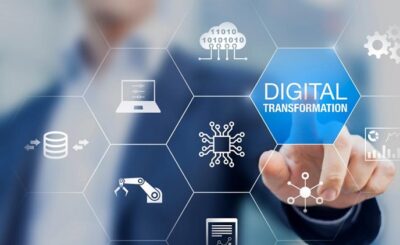Except for the individual voices of sociologists, political analysts, or civil society organizations, the world fascinated by the information revolution and artificial intelligence did not stop long to study the effects that these technologies had on society in general and democracy in particular.
What we still hear today, especially from politicians, are warnings that artificial intelligence supported by machine learning will provide tyrannical dictatorships with tools they never imagined, allowing them to monitor the subjects, to follow their movements, and to know what is going on in the minds of each of its members.
But is it enough that society is as democratic as it claims to be immune to the negative effects of this technology?
The fruits of competition
It seems that we have all fallen into the trap, and considered that democracy is enough to ensure our protection.
The rat race that we have all accepted as a necessity between democratic countries, led by the United States, and tyrannical countries, led by China, may be necessary to protect national security, as the governments of these countries say. Whoever wins will eventually own the oil of the third millennium and control the world.
And if the main resource of the economies of the future is data, then China, with its more than 1.5 billion inhabitants and its lax protection systems that allow state surveillance, seems destined to win the race.
But the population is not the only determining factor; there is the educational system and the scientific skills, which can give the United States a chance to emerge victorious.
According to analysts and experts, the winner will naturally be rewarded with artificial intelligence and give him an overall economic and military advantage.
The first “fruits of competition” to win the bet are the declaration of war on globalization, and the lighting of the fire that we thought was appeased between the United States and China.
However, limiting reflection when talking about artificial intelligence to the race for domination ignores a fundamental dimension, which is the ability of artificial intelligence to create a change in political practice within countries themselves.
While the world focuses on the implications of artificial intelligence for international political relations, it ignores the ability of technology to transform a democratic or authoritarian regime.
To this day, the world has been busy observing the implications of these changes in authoritarian regimes. China was the preferred model because it is the strongest economy, and what applies to it can be generalized to other authoritarian regimes around the world.
The profound effects of artificial intelligence began more clearly with the emergence of what is now called machine learning, the danger of which lies in giving intelligence technology the ability to s self-develop.
There are fears in the so-called democratizing world that machine learning is increasing polarization, deepening political division, and widely spreading false rhetoric hidden behind misinformation.
Just as machine learning reflects and reinforces divisions in democracy, analysts say it blurs authoritarian regimes and “creates the appearance of consensus and conceals underlying societal fissures until it is too late. ”
Although the early pioneers did not anticipate how machine learning would dominate artificial intelligence, its evolution matches their way of thinking. We find this clearly with the American economist Herbert Simon, (d. 2001) who recognized that “artificial intelligence technology has more in common with markets, bureaucracies, and political institutions than with simple applications of ‘engineering “. Another pioneer in the field of artificial intelligence, Norbert Wiener (d. 1964) described artificial intelligence as a “cyber” system capable of reacting and adapting reactions.
Cyber Systems
Today, Facebook and Google use machine learning as the analytical engine of a self-correcting system, constantly updating their understanding of the data based on the success or failure of its predictions. It’s this relationship between statistical analysis and feedback that has made machine learning such a formidable force, and it’s what Simon and Wiener’s work has focused on.
Democracy and dictatorship are also cybersystems. In both forms, governments adopt policies and then try to find out whether those policies worked or failed.
In democracies, the analysis provides powerful feedback on whether a particular approach is really working. In pre-information-age authoritarian regimes, insider intelligence and secret opinion polls were used to try to find out what subjects believed.
Today, machine learning is replacing traditional forms of feedback, as new technologies facilitate misinformation and exacerbate existing biases, taking the hidden bias in data and confidently turning it into incorrect claims.
For leaders of authoritarian regimes wading in the dark, machine learning seems to answer their prayers. This technology can tell them if their subjects are happy with what they are doing without the hassle of polls or the political risks of open debates and elections. For this reason, many observers fear that advances in artificial intelligence will only empower and empower dictators.
But the truth is more complicated. Obviously, bias is also a problem for democracies. But since it is more visible, citizens can mitigate it through other forms of feedback. For example, when an ethnic group sees that recruitment algorithms are biased against them, they can protest and seek fairness with some chance of success.
Whether authoritarian regimes are less or more susceptible to bias than democracies, bias in authoritarian societies is often invisible, especially to decision-makers at the top. This makes it harder to fix, even if leaders see something needs fixing.
Unlike traditional methods, AI can undermine authoritarian regimes by promoting their own ideologies and fantasies at the expense of a more accurate understanding of the real world. And democracies might discover that the main challenge of the 21st century in AI is not winning the battle for technological dominance. Instead, he will have to deal with authoritarian countries that find themselves in the middle of an AI-fueled vortex of illusions.
Most discussions of AI are related to machine learning and its relationship to statistical algorithms that explore the relationship between data. These algorithms are based on assumptions: will this chess strategy win the game in ten moves? What is the next word in this half-finished sentence? A so-called objective function, a mathematical way of recording results, can be equivalent to an algorithm if it guesses correctly. Simply put, this process is how commercial AI systems work.







